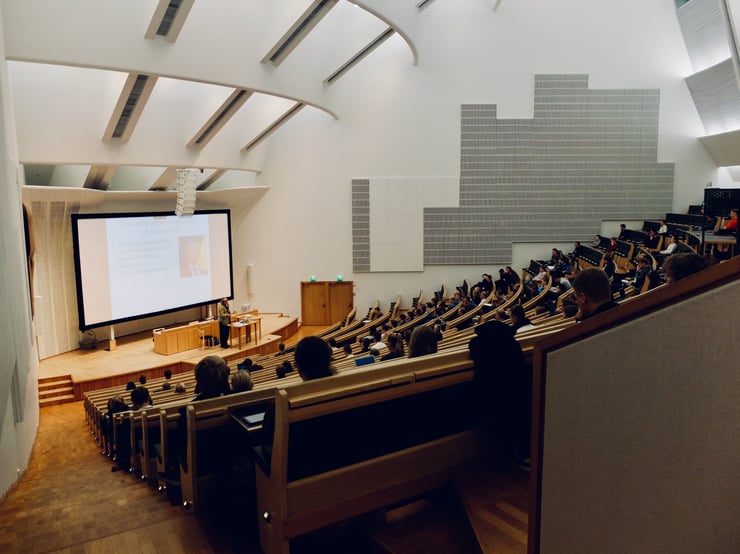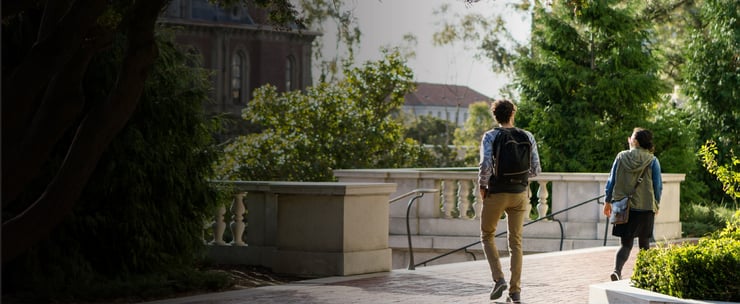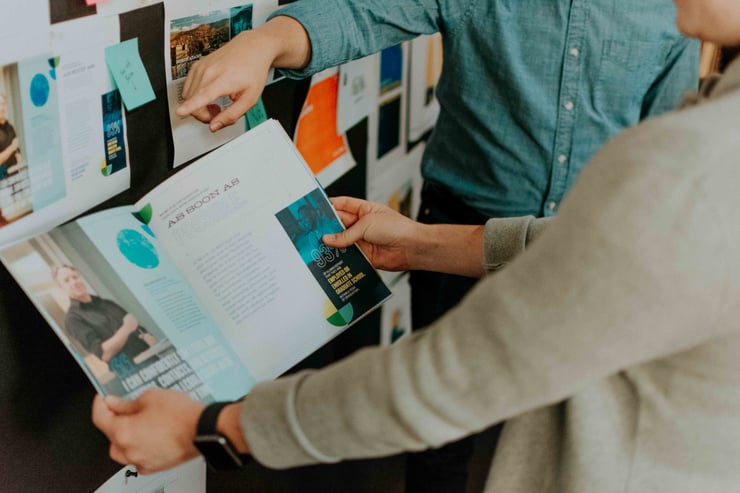We recently sat down with Kinnari “Kin” Sejpal to talk about the transformational higher ed experiences in India and the United States that helped make her a dynamic leader in today's higher ed marketing space. Kin is currently Vice President of Marketing and Communications/Chief Marketing Officer at the University of Redlands and, before joining Redlands, she served as the Associate Vice President, Marketing and Creative Services at Rochester Institute of Technology (RIT).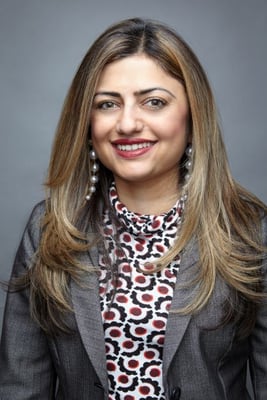
Thank you for spending some time with us, Kin! Back in February, you shared a picture on Twitter of where you came from, noting that even today modern conveniences like running water, air conditioning, and microwaves are still considered luxuries. That's where I'd like to start. Can you tell us about your upbringing?
I was born and raised in the suburbs of Mumbai, India and come from humble beginnings. Historically the suburbs were for people who couldn't afford a fancier lifestyle, as opposed to the “town side” where the government offices and stock market were located, and the wealthier elites resided. I would say we were lower middle class which was — and perhaps still is — a very prevalent classification in India. I lived in a flat (similar to what we call an apartment) with nine members of my "joint family" that included uncles, aunts, cousins, and grandparents. I am the only child of my parents, so I count my cousins as my sisters; we went to the same school, shared the same room, and lived in the same house. The photo I shared on Twitter shows the building I lived in (which my parents and some family still occupy). We lived on the top floor but it by no means compares to top floors that you see in America. For instance, our ceilings had bad leaks, especially during the monsoon season. The building is now in worse shape than when I lived there.

I had everything I needed growing up to live a lifestyle that was comfortable. However, how one defines comfortable varies. We did not have laundry facilities, air conditioning (temperatures could reach 130F!), or microwaves. I took buses and trains everywhere. Eating out was a luxury unless it was streetside food. The upper or upper-middle class, however, lived very differently than we did. Cars, air conditioning, chauffeurs, and just better schools in general. In a nutshell, there was a massive discrepancy in lifestyle and education.
Let's get into your educational journey. From your LinkedIn profile, I believe you earned your BA from one of the top colleges affiliated with Mumbai University in India. Can you take us through your college experience?
My father and his brothers were in a business together and never went to college. Their business took a big hit when a fire destroyed almost everything. I wanted to do something besides go into the family business. For me, college was the only affordable way to have a career. At the time, colleges were inundated with males so they heavily incentivized college attendance for females. It made a lot of sense to enroll at little-to-no cost and have a bachelor's degree under my belt so I could start working and stand on my own two feet. I wanted to be independent, but also help support my family given I was the only child, and our culture expects young adults to take care of their elderly relatives. Most of my peers and friends from school attended college as well. It was seen as an extension of high school, and just what everyone in my community did.
Fields of study in India were limited at the time. I basically had the choice between three disciplines: commerce/management, liberal arts/humanities, and science/engineering. My sole motivation was to get a bachelor's degree and I didn't care much about the choice of program, so I ended up in the commerce/management field. To me, and likely for many others, the college experience in India felt purely academic. It was very much a book learning model where one memorized the facts and took exams to regurgitate them. Students in my college predominantly lived at home and commuted every day — there was no on-campus experience to speak of like you see in the U.S.
What level of economic mobility would a bachelor's degree give someone in India?
People were either born or married into money, or they were poor. Not interested in using marriage as a means to gain economic prosperity, I started to explore education options in the U.S. I knew that I would only get so far with a bachelor's degree from a university in Mumbai. I could have a job, but it would not get me any farther than being able to pay my bills.
At the time, people were fascinated by the United States and those who went wore it as a badge of honor. It was a huge source of pride because it was the West and not everyone could afford to travel or study there. There was also evidence in the fact that people who studied and lived in the United States lived a better lifestyle, were more culturally and socially aware, became well-rounded individuals than those who stayed in India - even if they were in the same class category. For instance, middle class in the U.S. appeared much nicer than in India at the most basic level (electricity, running water, clean air, etc.). Not to mention, the American college experience of having project-based, hands-on learning, student clubs and activities, and meeting people from all over made studying here extremely attractive.
How did you end up at Purdue for your Master's degree?
It was a personal decision for me. I worked with agents (i.e., intermediaries between colleges and families in India) who helped narrow down my educational considerations to four or five institutions, and Purdue was one of them. Purdue had the largest Indian population out of all universities in America, so that was a selling point--especially for my parents. At the time, however, attending school outside of India was out of reach. I thought we could make it happen but it felt like I was putting a lot of burden on my parents. So, I gave up on the idea. Fast forward a few years - I got a job in India and was making enough to live (still with my parents) and pay the bills, but it certainly wasn't enough to save or support my family. Then, I met someone (who, by the way, was from the suburbs, so I didn't marry rich!) He ended up going to Purdue and we dated long distance. After eight years, I joined him at Purdue and earned my first master’s degree.
I started my educational journey in the U.S. by taking introductory classes in the communications program even though I already had a bachelor's degree. I was nervous in my ability to succeed in graduate-level coursework. My professor, however, recognized that I had the aptitude to be in the master's program and wrote me a recommendation so that I could advance to that level of coursework. Coming full circle, when I got into my master’s program I became a teaching assistant (TA) for the same introductory class in which I started just a few months ago! I was able to afford my education due to these types of assistantship opportunities.

I loved everything about studying at Purdue — it was so different than studying in India. I did a lot of unpaid internships and volunteer work because my visa did not allow me to work for money. I would volunteer with local nonprofits such as Big Brothers Big Sisters, United Way of Lafayette, Indiana University Health, Motorcycle Safety at Purdue, and Purdue School of Veterinary Medicine to offer my marketing and communications expertise and gain experience. I worked/volunteered the entire time I was getting my degree so I could make the most of the opportunities afforded to me (and as an added benefit, look good on my resume!).
When I graduated, Purdue was restructuring its central marketing operation and I reached out to their CMO, Teri Thompson, for an informational interview. That turned into my first full-time job in the Purdue Marketing and Media Strategy department. I enjoyed brand management, paid media, and analytics. I found myself using less and less of my communications degree (though it definitely still came in handy), and was learning and applying more marketing functions. So, I went back and got an MBA with an emphasis in Marketing. Even though I was working at the institution, I paid my own way to earn an MBA as it was one of the few degrees that did not qualify for an employee discount.
Who were some of your biggest influences in your professional journey?
Teri Thompson (referenced above) has definitely been a wonderful professional mentor. She taught me the ABCs of marketing (I say them all the time and teach all of my staff as well). Elizabeth Johnson and Terry Flannery have been my champions and mentors, too. My prior CMO and supervisor, John Trierweiler, was a huge confidence booster. He allowed me to take risks and fail forward. Any one who gave me internship opportunities, referred me, looked at my resume, or simply had coffee with me. There are too many people to name, really. I have been very lucky.
What led you to want continue your career in higher education brand marketing?
Higher education was life changing, both for me and my husband. My professors cared so much about my journey and I felt valued for who I was, not where I came from. The type of global enrichment I experienced is bar none. Both my husband and I are supporting our families (parents and grandparents). I don’t think any of this would have been possible if he, then I, did not pursue higher education here. My own experience as a student who was first-generation, international, and a person of color made me want to share what higher education can do for others like me.
We know that higher education is at a crossroads, but you continue to champion its transformative power to change lives (both in your life, and the students you directly market to). Can you share your vision for higher ed?
My vision for the world is equity and accessibility. I wish I could change the fact that someone's opportunities can be largely dictated by where they're born. And, extending that to higher education: I hope it continues to be accessible to all no matter a student's nationality or identity. I am one data point of success in this regard. The journey was not easy, but I am grateful to have been provided with access and opportunity.
The change in perception can only happen if we unite as an industry. It is the same idea of unifying our brand at our respective institutions. Except now we need to go a layer above and unify the industry around a common value proposition. The caveat here is that it cannot just be a bold declaration of our message in mass media; it needs to be true to our essence and existence and echoed by anyone and everyone who is engaged in this field.
What do you wish people understood about higher education, and higher ed marketing?
I wish more people knew that it’s more than an education in its traditional sense of the word. It is an experience. Yes, learning through courses and curricula is a part of the package, but that’s just one part of it. And that is why I think alternate or quick modes of learning, while popular, should not be the norm. In India, I took notes, I listened to lectures, I read materials, and I took exams. But, my education there does not compare to the full range of learning I had here. The U.S. model of learning is slowly making its way into the Indian educational system and now students have far more choices of majors and ways to engage outside academia. The experience of being a college student in the United States broadens your thinking in so many ways. It is life changing in the best way. I hope people here take advantage of the experiences and understand that it is not like this in many parts of the world.
As for the industry, I hope people consider working in higher ed as a meaningful and viable career pathway. I do not believe school counselors advise working in higher ed as an option most likely because there isn’t really a formal education for this industry. I hope we can be intentional about creating a pipeline of talent who will carry our industry forward. While many of us inadvertently stumbled into this line of work, a more deliberate approach to educating and developing a workforce for our industry is critical.
What is higher ed marketing doing well, and what could higher ed marketing be doing better?
I believe we do a good job of storytelling, building a brand, and bringing a scientific bent to our approach. I think the real gap is in the ongoing sophistication of marketing best practices. Unless higher ed marketing catches up to consumer expectations, there will always be ongoing pressure on the field, and therefore on us. And since consumer expectations are always evolving, what we really need is a more sustainable strategy for higher ed marketing to keep up with the changes.
It is a tall order. We have to overcome a skills gap (constantly changing trends), trust gap (harder to quantify ROI than other fields like enrollment or advancement), and power gap (most of the people who determine the quality of customer experience don’t report to marketing). This ongoing challenge can be mitigated but it must start with entrusting CMOs and giving them latitude to draw outside the lines.
Last question, I promise! What is the best piece of advice you've received in your career?
I have a couple:
“As you go up the ladder, don’t forget to connect with the end customer. That is what will ultimately keep you grounded.”
I suppose in a way that is why I engage with students even outside of work.
“First learn about the people and culture, then about the job.”
This is simple but incredibly useful, especially as someone coming from a totally different culture. It started very broad for me in learning about the country and then understanding the nuances of different regions and communities within the United States. Now, I am learning the culture of California and the University of Redlands.
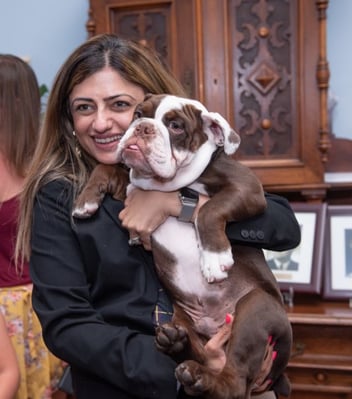
----
Huge thanks to Kin for sharing her inspiring story and insights with us! You can catch up with Kin and learn more about her new role as Vice President of Marketing and Communications/Chief Marketing Officer at the University of Redlands on Twitter and LinkedIn.




